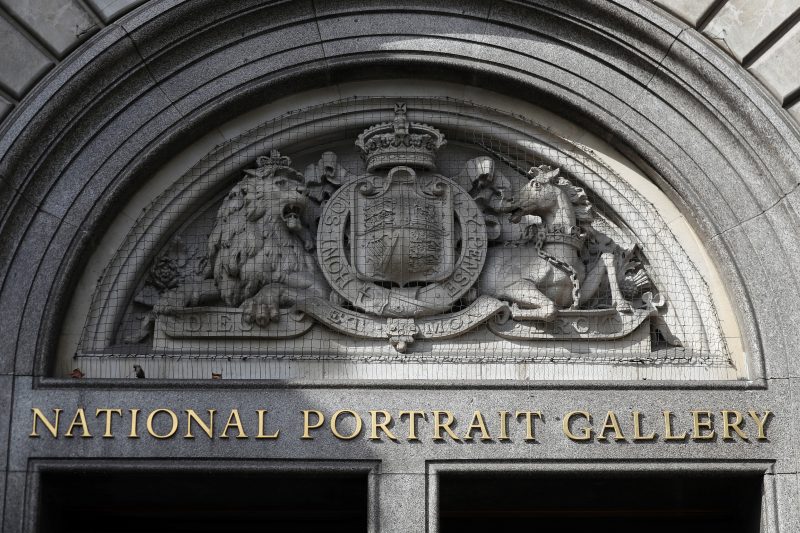Sackler donations rebuffed amid opioid crisis
The National Portrait Gallery is among a group of notable institutions that have rejected donations from the Sackler family, tainted by association with the US opioid crisis (Daniel LEAL-OLIVAS)
New York (AFP) – Large museums are rejecting funds from the Sackler family, underscoring the growing unease with the main source of the philanthropic dynasty’s riches: the painkiller at the center of the US opioid crisis.
With net worth estimated at more than $13 billion, the Sacklers are among the world’s richest families, according to Forbes. And they have used their wealth to become significant funders of the arts and education.
Their story is the epitome of the American dream: three brothers — Arthur, Mortimer and Raymond — born in Brooklyn to Jewish immigrants who arrived in New York after World War I, become psychiatrists, and then built Purdue Pharma after buying a struggling New York drug company in 1952.
Purdue became a dominant force in the pharmaceutical industry, largely due to the blockbuster painkiller OxyContin, the highly addictive drug now subject to more than 1,000 lawsuits over its role in the opioid crisis.
The company’s success helped the brothers amass enough wealth to become major philanthropists: the Sackler name is a visible presence at Harvard, Cornell, Columbia, Yale, Tufts and Oxford universities, as well as entire wings of two of the world’s greatest museums: the Louvre in Paris and the Metropolitan Museum of Art in New York.
The donations earned Arthur the moniker of a “modern Medici” by art scholar Thomas Lawton. Arthur passed away in 1987, nearly a decade before OxyContin was introduced, and his heirs sold his stake in Purdue to the other two brothers when he died.
The wealth of the remaining branches was based on what the New Yorker magazine called “an empire of pain” through “ruthless marketing.”
– Cutting ties –
That tradition of giving continued in the next generation, with two of Raymond’s children endowing a professorship at the Yale Cancer Center.
“My father raised Jon and me to believe that philanthropy is an important part of how we should fill our days,” Richard Sackler said in 2009.
Richard, who lives in Austin, Texas, also has donated to both the Democratic and Republican parties and conservative think tanks.
Mortimer Sackler had luxurious mansions in London, the south of France and Switzerland. Several of his seven children have been on the board of Purdue, while one, Mortimer D.A. gave $9 million to the Guggenheim museum between 1995 and 2015.
But the museum has cut all ties with the family.
“No additional gifts are planned, and the Guggenheim does not plan to accept any gifts,” the museum said Friday.
Britain’s National Portrait Gallery earlier this month cancelled a £1 million ($1.3 million, 1.1 million euros), donation from the Sackler Trust and the UK’s Tate galleries followed suit.
The trust on Monday announced it was suspending all donations in Britain.
– ‘Deceptive’ practices –
The privately-held Purdue Pharma, based in Connecticut, released OxyContin in 1995 and the powerful drug reportedly has generated more than $30 billion in revenues.
In 2017, 47,000 people died of opioid overdoses in the United States (prescription drugs, heroin and fentanyl), according to the Centers for Disease Control. That same year, 1.7 million people were suffering from addiction to painkillers like OxyContin.
The Sackler family has been inextricably linked to the company: Mortimer and Raymond led Purdue as the company developed OxyContin into a blockbuster drug. Mortimer died in 2010 and Raymond in 2017. The last Sackler left the Purdue board earlier this month.
In 2007, Purdue and three top executives pleaded guilty to a felony charge by the US Justice Department for lying about the addiction risk posed by OxyContin, and paid a fine of $634.5 million.
The company remains the target of about 1,600 lawsuits in federal court, as well as hundreds of complaints at the state level.
A complaint filed by Massachusetts state charged that Sackler family members “directed deceptive sales and marketing practices.”
On Tuesday, the company reached a $270 million settlement with the state of Oklahoma of a lawsuit holding drug companies responsible for the addiction epidemic, according to media reports.
The family gives few interviews, but is regularly photographed at society gatherings. A family spokesperson declined to comment for this story.
Disclaimer: This story is published from a syndicated feed. Siliconeer does not assume any liability for the above story. Validity of the above story is for 7 Days from original date of publishing. Content copyright AFP.


